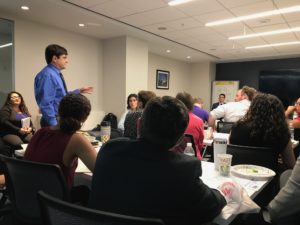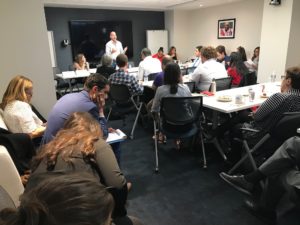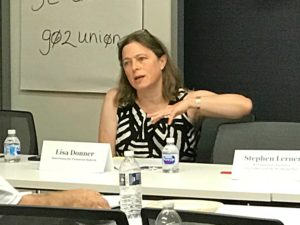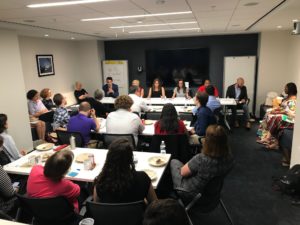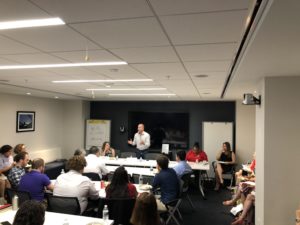On Thursday, July 19, the Bargaining for the Common Good Network convened a luncheon entitled Regulating from Below, which highlighted the role Bank Workers can have in Bargaining for the Common Good
On Thursday, July 19, the AFL-CIO, Friedrich Ebert Stiftung, the CWA, Rutgers’ Center for Innovation in Worker Organization, and Georgetown’s Kalmanovitz Initiative for Labor and the Working Poor hosted a discussion on the importance of organizing bank workers. The event featured introductory remarks from Kalmanovitz Initiative Director Joseph McCartin and Sara Burke from the Friedrich Ebert Foundation, followed by an overview of Bargaining for the Common Good presented by Kalmanovitz Initiative fellow Stephen Lerner and Lisa Donner from Americans for Financial Reform and a panel discussion featuring organizers, bank employees, and union staff members who have been deeply engaged in this work.
Stephen Lerner, Lisa Donner, and Joseph McCartin all highlighted how the campaign to organize bank workers is a quintessential example of unions responding with offensive action in the wake of the Janus decision and Bargaining for the Common Good. Instead of going on the defensive, unions can tackle seemingly impossible targets like Wells Fargo and other financial giants to earn just working conditions for their employees and protect community members from predatory financial practices. All three speakers emphasized how organized bank workers can fight for working conditions and compensation systems that don’t force them to enact predatory sales practices against consumers, thereby reducing the burden large financial institutions can place on working communities.
All five members of the panel emphasized the importance and difficulty of organizing bank workers in an age of increasing financialization and inequality. Meggan Halvorson, an employee at Wells Fargo, spoke about how “the compensation system is not good for employees or consumers.” Reflecting on her experiences as an employee, she discussed how she “started suffering from severe anxiety and migraines” when she started working there. When she informed her therapist, “she sighed and said most of her clients work there too. The problem is systemic.” Shanon Bade and Arnise Porter, organizers with the Committee for Better Banks, discussed the scare tactics used by banks to discourage employees from unionizing and reiterated how their compensation system is used to “create animosity between employees and undermine solidarity.”
Molly McGrath, a growth strategies researcher for the AFL-CIO, commented on the innovative strategy behind the idea of “regulating from below,” and compared financial practices in the U.S. to those in countries where bank workers are organized, noting that these countries have notable reductions in inequality and predatory banking abuses. Graham Steele, a financial regulation expert, discussed how policymakers and regulators have failed to address underlying issues since the 2008 financial crisis: “Policymakers throw their hands in the air about how to measure ‘bank culture’ and oversee these practices. There’s a simple solution: talk to the workers who are on the ground experiencing these issues first hand.” Brandon Rees, Deputy Director of the AFL-CIO’s Office of Investment, offered hope by sharing some of the progress that has been made in organizing bank workers: “Employees under the NLRA have the right to challenge their working conditions, including the compensation structure that exploit both workers and consumers, without being retaliated against. Educating bank workers about this right has been enormously empowering in challenging the injustices we see at financial institutions like Wells Fargo.”
A recent article in The American Prospect provides more information on how Bank Workers can fight against their employers toxic practices, and Market Watch covered a sister event held in New York City.
Below are a handful of the pictures taken throughout the event by Alex Taliadoros and Julian Brunner

